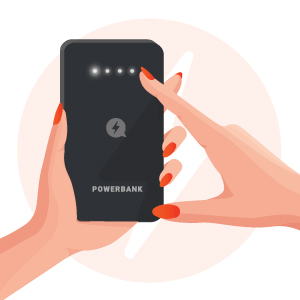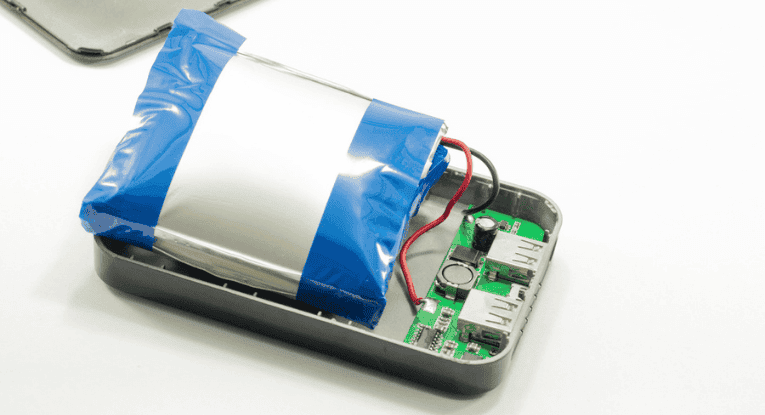Finding time to charge your devices can be a real struggle, which is why you usually do it while not using them, let’s say while working, on the go, or before going to bed. The last one has become a routine for power bank owners, particularly because it ensures that, in most cases, their power banks will be fully charged by the time they wake up.
In fact, at some point, most of you not only have left your power bank plugged into a power outlet but also charging another device, or even doing both at the same time.
While this is a common practice for many, others question whether this can incur damage to their devices. So, is this a safe method to charge your power banks?
Can Power Banks Be Charged Overnight?
Besides, most brands manufacture their products with chipsets that offer protection against voltage surges, overcurrent, high temperatures, as well as overcharging. This kind of protection prevents the power bank from drawing more power to its battery once it is at 100% by switching to a mode known as trickle charging. During this state, the battery of the power bank will remain fully charged by taking as much power as its self-discharge rate.
However, you can not simply overlook the numerous warnings from manufacturers and news reports. The biggest common mistake among users is to think that every power bank has been designed the same way, including premium chipsets, multiprotection systems, trickle-charge function, or allowing charge and discharge at the same time, a function that is known as pass-through.
What Happens If a Power Bank is Overcharged?
 As you might know by now, one of the potential risks of leaving your power bank charging overnight is that it can get overcharged. Of course, if the power bank is of a reputable brand and has been properly designed, it’s highly unlikely that it overcharges. Still, Li-ion batteries suffer stress when exposed to high voltage for a prolonged time.
As you might know by now, one of the potential risks of leaving your power bank charging overnight is that it can get overcharged. Of course, if the power bank is of a reputable brand and has been properly designed, it’s highly unlikely that it overcharges. Still, Li-ion batteries suffer stress when exposed to high voltage for a prolonged time.
If you consider that charging your power bank overnight is the option that best accommodates your schedule, you must also keep in mind the potential risks that go along with it. Otherwise, your power bank might overheat, swell, or even start a fire.
If you doubt your power bank can start a fire, check our article “Can power banks explode?“
Extreme Heat
All power banks experience a rise in their temperature while they’re charging or charging other devices. However, if yours gets too hot to hold in your hand, you should be worried as it might cause overheating, or even worse, a fire.
So, what should you do when this happens? The easiest and most effective thing to do is to unplug it immediately and wait until it’s cooled down to plug it back to continue charging.
Swelling or Expansion
Most power banks contain either lithium-ion or lithium-polymer batteries, so when they become faulty or overheat, these start to become swollen to the point of exploding with the passing of time.
The good thing is that swelling is easy to notice, and thus, it’s a hint that your power bank it’s getting damaged, and it’s time to replace it.

Inconsistent Charging
Most of the time, when a power bank doesn’t charge as it used to, it might mean that its internal batteries are aging and losing their power, something completely natural. However, its decreased performance might be due to a mechanical failure, which can lead to shortages, explosions, or fires.
Therefore, if you notice a significant difference in your power bank’s performance, stop using it, and buy a new one to prevent accidents.
Power Bank Safety Precautions
The following tips will help you extend the battery life of your power bank and avoid accidents while you’re sleeping.
- Avoid leaving your power bank on extended charge as it might experience overheating.
- Read the manufacturer’s guidelines, and stick to the recommended time to fully charge your power bank.
- Abstain from charging your power bank on surfaces and confined rooms where the temperature can rise, such as on your bed or drawers.
- If you sense that the power bank gets extremely hot while charging or discharging, instantly unplug it from the power outlet or the device it is charging.
Final Thoughts
As we’ve learned, depending on the model, charging a power bank all night long can be safe, provided that there’s no flaw in its manufacture and that it has safety features.
For this reason, when buying a power bank, make sure to invest in one of good quality so that you can ensure its battery won’t be damaged as a result of overnight charging.
Nevertheless, if your power bank’s capacity is so big that it requires you to do so, just remember to follow the proper safety measures, especially placing it away from you during your sleep.
